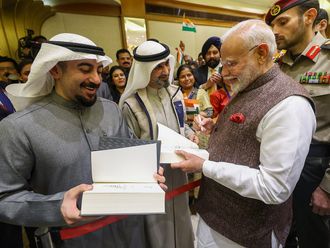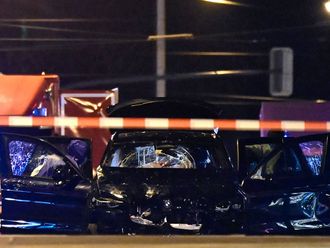Manama: The final draft of the Gulf Cooperation Council (GCC) security agreement is ready and will be reviewed by interior ministers of member states on Monday.
“The interior ministry undersecretaries have discussed the final draft and it was forwarded to the interior ministers who will review it when they convene,” said Gazi Al Omar, assistant undersecretary in Kuwait’s Interior Ministry.
The GCC is going through critical times that require a unification of policies, plans and ways of executing strategies of individual security agencies, the official said, Kuwait News Agency (Kuna) reported.
The move would allow the GCC as a whole to deal more effectively with any negative consequences of events in the region on national security of member states, Al Omar said. He said the political situation in the region demanded that GCC states responded quickly and took appropriate preventive measures to confront potential threats to their security and stability.
“We call for new coordination measures and tools for follow-up and prompt reactions in [dealing] with the emergency security developments and events within the GCC,” he said. “This can be achieved through unifying policies and joint action plans, the exchange of information and data and bringing viewpoints closer on the impact of these events on the national security of the member states and on the adequate measures to deal with them.”
The security agreement could be taken up by GCC leaders when they convene for their annual summit in December in Bahrain.
In May, the GCC leaders endorsed an agreement to promote collective security among the six member states. GCC secretary-general Abdul Latif Al Zayani said at a press conference in Riyadh following the 14th GCC consultative summit that all the countries approved of the accord and that the leaders had instructed their interior ministers to sign it.
The agreement stipulates full cooperation between member states and mutual responsibilities to preserve collective security and stability. It also highlights the need to promote common security arrangements of the highest standards to help combat transnational and organised crime and boost full compliance with the law by all GCC citizens across the member states.
Prince Nayef Bin Abdul Aziz Al Saud, then Saudi crown prince and interior minister, said that the GCC security agreement would help “preserve our achievements and stability and would ensure the collective security” of GCC states. “Any threat or harm to any of the GCC states targets all of us,” he told a meeting of GCC interior ministers.
The initial security agreement was announced in Manama in December 1994, but only Bahrain, Saudi Arabia and Oman endorsed it. Qatar followed suit in 2009. However, the GCC leaders at their 2010 summit in Kuwait called for focusing fresh attention on the pact by putting it before a committee of experts and specialists from the GCC states.












